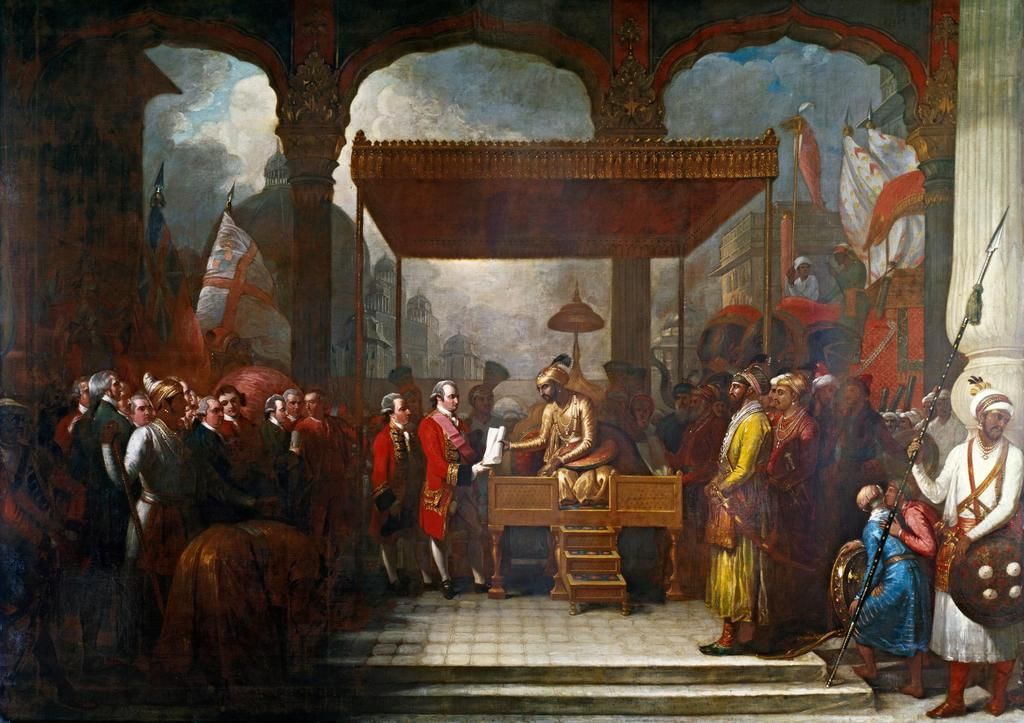Class 8 Exam > Class 8 Notes > Social Studies (SST) Class 8 > Grant of Diwani and Financial Powers
Grant of Diwani and Financial Powers | Social Studies (SST) Class 8 PDF Download
Grant of Diwani and Financial Powers
- On 12 August 1765, the Mughal emperor appointed the East India Company as the Diwan of Bengal. As Diwan, the Company became the chief financial administrator of the territory under its control.
- Now it had to think of administering the land and organising its revenue resources. This had to be done in a way that could yield enough revenue to meet the growing expenses of the company. A trading company had also to ensure that it could buy the products it needed and sell what it wanted.
 Grant of Diwani
Grant of Diwani - Over the years the Company also learnt that it had to move with some caution. Being an alien power, it needed to pacify those who in the past had ruled the countryside, and enjoyed authority and prestige. Those who had held local power had to be controlled but they could not be entirely eliminated.
Growth of Revenue
- The Company had become the Diwan, but it still saw itself primarily as a trader. It wanted a large revenue income but was unwilling to set up any regular system of assessment and collection. The effort was to increase the revenue as much as it could and buy fine cotton and silk cloth as cheaply as possible.
- Within five years the value of goods bought by the Company in Bengal doubled. Before 1865, the Company had purchased goods in India by importing gold and silver from Britain. Now the revenue collected in Bengal could finance the purchase of goods for export.
Growth of Problems for Common People
- It soon became evident that the economy of Bengal was in serious trouble.
- Artisans left villages as they were forced to sell goods to the Company at low prices.
- Peasants struggled to pay the dues demanded from them.
- Artisanal production declined, and agricultural cultivation was collapsing.
- In 1770, a devastating famine occurred, resulting in the deaths of ten million people in Bengal, about one-third of the population.
The document Grant of Diwani and Financial Powers | Social Studies (SST) Class 8 is a part of the Class 8 Course Social Studies (SST) Class 8.
All you need of Class 8 at this link: Class 8
|
69 videos|431 docs|46 tests
|
FAQs on Grant of Diwani and Financial Powers - Social Studies (SST) Class 8
| 1. What is the significance of the Grant of Diwani and Financial Powers in class 8? |  |
Ans. The Grant of Diwani and Financial Powers in class 8 refers to the transfer of administrative and financial control to the British East India Company by the Mughal emperor Shah Alam II. It marked the beginning of British control over the revenue administration of Bengal, Bihar, and Orissa.
| 2. How did the Grant of Diwani and Financial Powers impact the British East India Company? |  |
Ans. The Grant of Diwani and Financial Powers allowed the British East India Company to take over the collection of revenue in Bengal, Bihar, and Orissa. This gave the company immense financial power and control over the resources of the region, which further strengthened their position in India.
| 3. Who granted the Diwani rights to the British East India Company? |  |
Ans. The Diwani rights were granted to the British East India Company by the Mughal emperor Shah Alam II in 1765. This grant gave the company the authority to collect revenue and administer the region on behalf of the emperor.
| 4. What were the consequences of the Grant of Diwani and Financial Powers for the Indian economy? |  |
Ans. The Grant of Diwani and Financial Powers had significant consequences for the Indian economy. It led to the drain of wealth from India to Britain, as the British East India Company exploited the resources and collected revenue for their own benefit. This exploitation had a detrimental effect on the Indian economy, leading to poverty and stagnation.
| 5. How did the Grant of Diwani and Financial Powers pave the way for British colonial rule in India? |  |
Ans. The Grant of Diwani and Financial Powers was a crucial step in the establishment of British colonial rule in India. It gave the British East India Company the financial and administrative control they needed to expand their influence and assert their authority over the region. This paved the way for further British conquests and the eventual establishment of direct British rule in India.
Related Searches






















